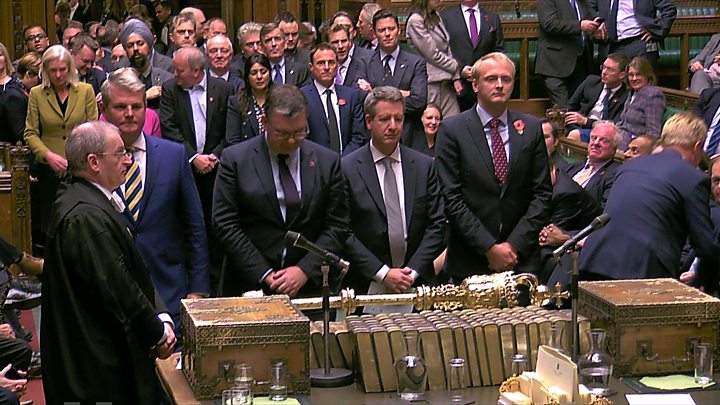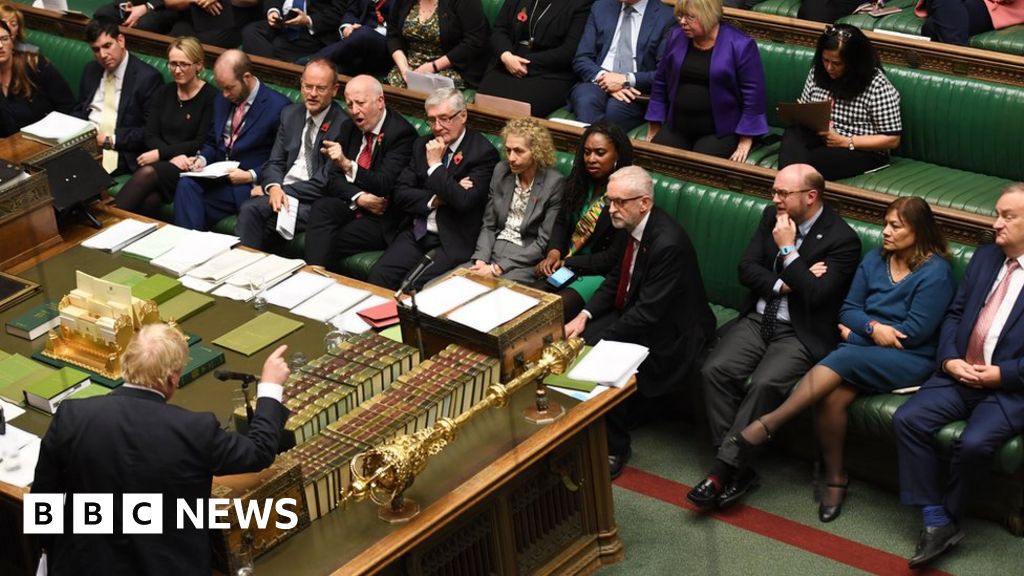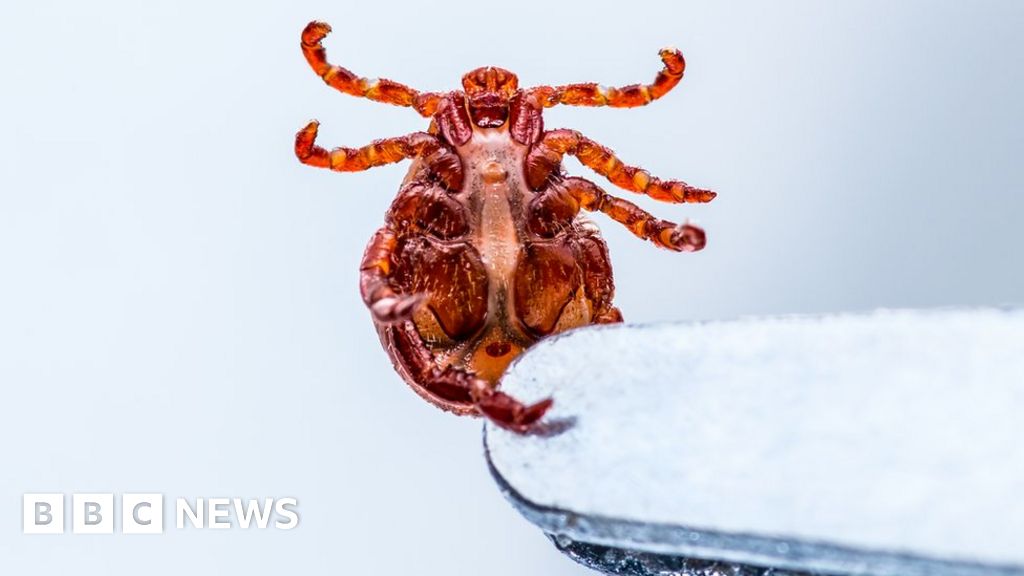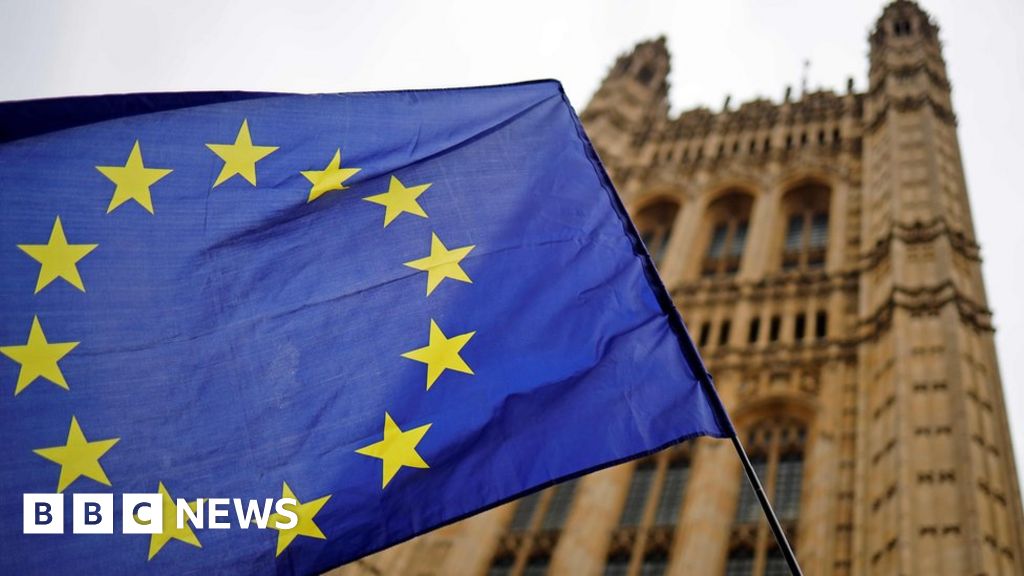Media playback is unsupported on your device
Political parties are readying themselves for a general election campaign after MPs voted for a 12 December poll.
The legislation approved by MPs on Tuesday will later begin its passage through the House of Lords, where it is not expected to be opposed.
Boris Johnson says he is ready to fight a "tough" general election.
Labour leader Jeremy Corbyn said the snap poll gave a "once-in-a-generation" opportunity to transform the country.
His shadow chancellor, John McDonnell, said the election wouldn't just be about Brexit - telling BBC Radio 4's Today programme: "It will be about austerity [and] about what's happened to our public service."
But Mr Johnson hopes the vote will give him a fresh mandate for his deal to leave the EU and break the current deadlock in Parliament.
He told Conservative MPs it was time for the country to "come together to get Brexit done", adding: "It'll be a tough election and we are going to do the best we can."
Health Secretary Matt Hancock said he was "certainly not yearning for general election", but he believed it was "the only way to move the country forward".
The poll comes after the EU extended the UK's exit deadline to 31 January 2020 - although Brexit can happen earlier if a deal is agreed by MPs.
The leaders of the UK's main two political parties will face off for Prime Minister's Questions at midday on Wednesday.
What happens next?
- The Early Parliamentary General Election Bill - which prompts the election - will be debated in the House of Lords on Wednesday
- If peers make any amendments to the bill, it will head back to the Commons for MPs to approve or reject the changes
- Once passed, the bill will receive Royal Assent - when the Queen formally agrees to the bill becoming law
- On Monday 4 November, MPs are due to elect a new Speaker to replace John Bercow
- Just after midnight on Wednesday 6 November, Parliament will be shut down or "dissolved" - meaning every seat in the House of Commons becomes vacant
- Five weeks later, the country will go to the polls for the first December election since 1923
What have the other parties said?
The Liberal Democrats and the SNP both see the election as a chance to ask voters whether Brexit should happen at all.
Lib Dem leader Jo Swinson said the poll was "our best chance to elect a government to stop Brexit".
Asked if she would form a coalition government with Labour or the Conservatives, she said: "I can't be clearer - neither Boris Johnson nor Jeremy Corbyn is fit to be prime minister."
But deputy Lib Dem leader Ed Davey said the party was in discussions with Plaid Cyrmu and the Green Party "to see if we can work with them".
Mr McDonnell also said there would be "no deals, no coalitions" with other parties if Labour failed to win an overall majority.
For the SNP, Scotland's First Minister Nicola Sturgeon said an election was an opportunity for the country to hold another independence referendum.
"A win for the SNP will be an unequivocal and irresistible demand for Scotland's right to choose our own future," she said.
But the Scottish Conservatives claimed voting for their party would keep Scotland in the UK.
Brexit Party leader Nigel Farage welcomed the election, tweeting the deadlock had been "broken" and "Brexit now has a chance to succeed".
But co-leader of the Green Party Jonathan Bartley said the poll should be "a climate election" and focus on environmental issues.
The legislation approved by MPs now must be rubberstamped by the House of Lords.
It would be pretty strange if unelected peers up the corridor from the green benches decided to say no or throw spanners in the works of a decision made by the House of Commons last night.
Unless something very strange happens, we are now on for an election.
Both sides are very, very nervous about what might unfold. And both sides are right to be nervous.
The two main party leaders, in a strange kind of mirror of each other, are happy campaigners, but divisive characters.
Both of them will try to set the agenda, but they can't know where this will all take us.
They can't know if it will be their issues they're able to talk about at length, but that's the glory of elections - it's up to voters to set the terms.
They decide the things they care about, they are interested in and they will put politicians on the spot about.
How did we get here?

Media playback is unsupported on your device
On Tuesday Mr Johnson's team tabled a one-page bill proposing a 12 December election to the Commons which needed the support of only a simple majority of MPs.
Labour's amendment to change the date of the proposed election from 12 to 9 December was rejected and MPs voted to back the government's original bill by 438 votes to 20.
More than 100 Labour MPs did not take part or abstained in Tuesday's crucial vote, while 11 voted against an election. A total of 127 Labour MPs, including Mr Corbyn, supported the election.
The bill, approved by MPs, paves the way for the first December election since 1923.
https://www.bbc.com/news/uk-politics-50230931
2019-10-30 08:40:09Z
52780420866456


